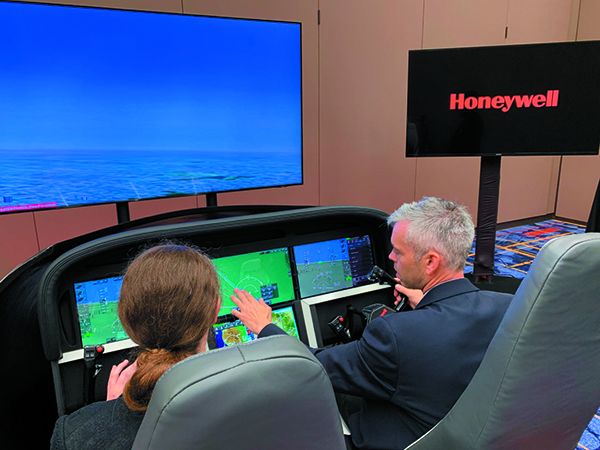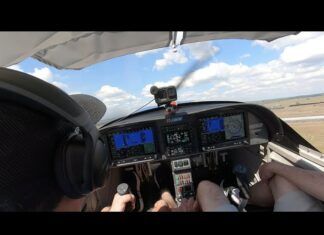At the NBAA-BACE show in Las Vegas this past October, Honeywell was showing a clean-sheet avionics suite called Anthem, and I almost missed the nearly silent announcement. I wondered why the company didn’t make a bigger deal of it at the show. This worries me because the system—the new standard for integrated avionics partly because it uses a cloud-connected architecture—will fight for some of the market spaces occupied by Garmin, both forward-fit and retrofit, and in cockpits big and small. It should have been bragging about this thing through a megaphone on the convention floor because the thorough demo I saw in private was impressive. There’s a lot on the line.
Kudos to Honeywell product line director Jason Bialek, and the engineering effort behind Honeywell Anthem. From what I saw during the well-presented one-on-one demo of the system in a full-sized cockpit simulator, Anthem’s automotive-inspired ergos (think big-screen-equipped Tesla dashboard) look to be one terrifically executed and smartly integrated avionics suite—more modern and capable than any other my jaded eyes have seen in over 30 years covering the market. We did an overview for this issue of Aviation Consumer, and you can bet we’ll have our eyes and ears on this as Honeywell works on FAA certification.
Anthem’s ability to earn sizable traction in both the forward-fit and retrofit market will depend on the efforts of Honeywell’s marketing team. Post-show, all of my technical follow-ups have been answered quickly, thoroughly and honestly. But I don’t matter. It’s OEMs and a to-be-established dealer network Honeywell has to bring aboard the gravy train. These—and existing inked business deals with Garmin—are huge hurdles, in my estimation, and I’d imagine Honeywell fully understands this. Its strategy is anyone’s guess.
For starters, the company made it clear that Anthem is not a BendixKing product. That division of Honeywell will for now remain in place to sell and support autopilots and repurposed products from third-party manufacturers. Still, Honeywell’s Anthem will eventually replace the AeroVue series, an integrated avionics system for certified and experimental applications that the company has invested sizably in, but with little traction in the aftermarket and at OEMs, both of which are heavily dominated by Garmin product.
Garmin’s fully certified and proven G3000 and G5000 flight decks have gained sizable penetration in the forward-fit and retrofit bizjet and airliner market—an area that Honeywell for years has managed to respectfully serve, along with Collins Avionics and Universal Avionics. Moreover, Honeywell’s current Primus Epic 2.0 and Epic 2.0+ integrated avionics systems are far from bottom-barrel avionics. Primus Epic is front and center in the Pilatus PC-24 jet, and the Apex version of the Epic has been firmly planted in the PC-12NG/NGX turboprops, earning mostly high marks for owner satisfaction and advanced mission capability. If you’ve used it, you’ll know that Honeywell’s Primus Epic for Gulfstream’s mighty PlaneView cockpit is no joke. And from what I saw, neither is Honeywell Anthem, and it could very we’ll change the way the industry approaches integrated avionics. The company says it will offer scalable versions—from Cessna Skyhawks to Citations and plenty in between, plus versions for the experimental homebuilt market. For the latter crowd, I suggest prefab harnesses for a foolproof installation. As for OEM applications, in theory the potential is huge. You know the platforms—from Cirrus pistons and the Vision Jet, Piper’s M-series, Daher TBMs, and Embraers—to Textron pistons and turbines. These all currently sport Garmin glass, and come with a big field and factory support network.
It’s far too early to vouch for the system’s reliability and you can bet there will be growing pains—something Garmin has mostly tamed. But at first blush, the Honeywell Anthem seemed so capable and such a refreshing departure from the familiar that it would be a shame if it didn’t gain the shot it deserves for both retrofit and as an OEM option. —Larry Anglisano


